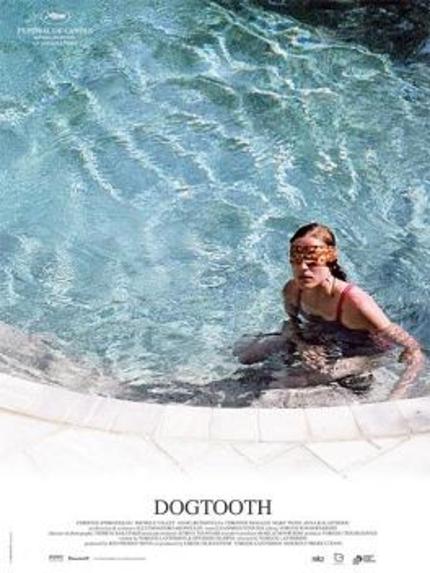For Your Consideration: Dogtooth

"The goal for me--and I think it is most of the time, when I make a film, or whatever I make--is to make something that is very open. Even if there are other issues raised by the film, I never try to incorporate them myself while making it, or while writing the script. I think by making something simple and very true to a specific idea that you have, if you make the choices that leave it open to people so they can actually watch it free and of their own experience, background, and education--if you've constructed the film in the way that you allow them to be able to think about things, and not force on them your own opinion, then it could be about anything that these people are interested in and concerned about." - Director Giorgos Lanthimos in interview with the A.V. Club
The idea here, the concern, is a system of control, without pretext or supposition, exhibited through the isolated and specific indoctrination of the nascent, human brain: What happens in a societally hermetic environment, when, through specific, targeted instruction, a set of children are raised? How far can you alter an incipient mind's perception of the world, and to what ends? The outcome, decidedly depends on the parent's prerogatives, as well as any interfering, outside stimulus and while Dogtooth only dabbles in the former it comically traffics in the latter.
We begin with the children - two girls and a boy, each, with the physical proportions of a shapely twenty-something, though endowed with the worldly cognizance of a kindergartner - listening to a cassette tape, their mother's calm, instructive voice wafts from the tape deck, conducting a deceptively transformational vocabulary lesson. Places and ideas that do not fit into the parent's idea of household are transformed into objects and concepts that fit into the children's everyday experience. These idiosyncratically normalized definitions pertain at first to the idea of the outside world: 'sea' turns into a chair, 'motorway' to a strong wind, 'excursion' a resistant material, and 'carbine' a white bird; vacation scrubbed from understanding, weaponry a bird of peace.
Intent is a purposeful mystery when it comes to the idea; an unnatural, forcefully instructed ontological shaping with no stated purpose or goal. To the best of our knowledge the parents want the best for their children, hiding them away from worldly evils. The house spacious, its garden giving; the type of home one cannot resist the urge to live in. The world, its ways and means, its people and places are never seen. We glimpse a factory, the only primary landmark outside of the house, nondescript and ambiguous in manufacture; this is the world's canvas. Dogtooth's brilliance resides here, in the blankness, in Lanthimos' ability to strip away society and recreate childhood, isolated, and with a sadistic physiological imposition.
The means working here may be good, or better, well-intentioned and while they are the foundation for what is to be witnessed they are not the focus. An angry, malefactor aimed, utterance of "I hope your kids have bad influences and develop a bad personality" our only verbal glimpse into reason, codifying into the base of parental protection and little more, outside of the violence.
The systemic indoctrination of the children continues, in a playfully devious manner. Competitive behavior is instilled in the children through the refereed playing of games; each game with a singular winner, the winner awarded a sticker. Sports, exercise and education become contests, filling the garden, swimming pool and household with contention. The sticker, a symbol of affection and pride, is placed on the winning child's headboard and periodically tabulated. A public announcement of scores over dinner crowns a winning child, awarded the privilege of choosing the family's entertainment for the evening.
Competition, while healthy, breeds physical violence. The phatic sibling rivalry not just a punch-on-the-shoulder in discontent, but a wider wielding of knives and hammers. There is no comparison for the children, no society to judge or model to liken to. When a knife wound can be antiseptically bandaged in moments, healing, most likely, without scarring: how much does it matter in the grand scheme of life? These animalistic exertions of the children a by-product of the system and if taken down the hereditary chain may lead to something horrible - or, you know, not.
Parallel to the children's training, a dog, owned by the family, is being run through its own life-shaping ringer. Placed in a program that comically echoes the children's indoctrination, the dog sheepishly works towards becoming an obedient defense animal, trained to protect the family, their garden, their home and their idea; the father impotent outside of submission to the process.
Continuing in this manner, introducing further mechanisms, letting slip, allowing entry; resolving into a furthering of one direction and the end of another. There are many facets that will go unmentioned here, these machinations balance: leaning against the walls set up for them, sometimes toppling, other times bearing fruit. My reading of Dogtooth lies in the violence, the training, the design, less the will, less the intent. Affording the mind's perpetual alley running, offering a new place, a new direction to ponder with each viewing.
A cavernous echo of indoctrination, reverberating across social conforms, the need for accolade, pedagogical trust and frankly, just about any allegorical imposition you want to throw at.
Dogtooth is now available on Netflix Instant as well as DVD and an impeccable construct I will be rooting for come Oscar time.







